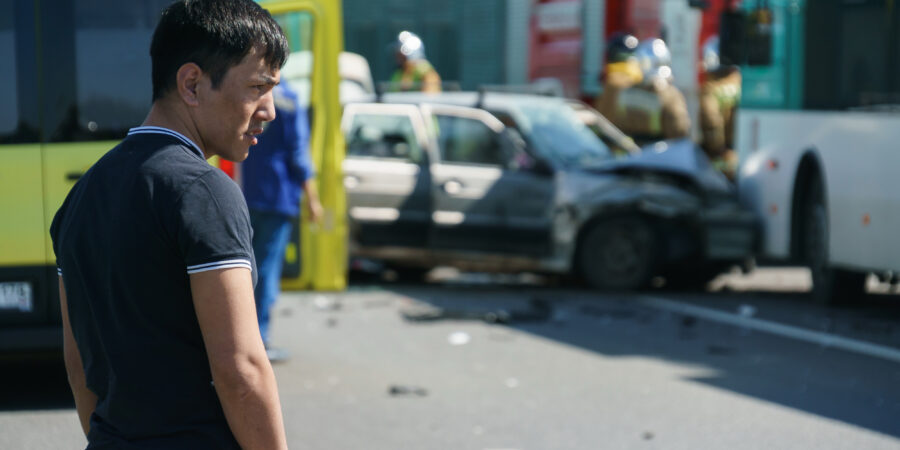How a Car Accident Witness Can Impact Your Case
In many types of car accident claims, the drivers involved have their own version of what happened. Versions may be swayed by the point of view at the time of the accident, distracted driving and more. Some drivers may even lie outright to avoid assuming liability for the accident. In a case of he-said, she-said, different aspects of the case may be analyzed by the insurance company. For example, photographic evidence taken at the scene may come into play. Another crucial type of evidence that can be used is an observer’s statement.
The Impact of a Car Accident Eyewitness on Your Personal Injury Case
Insurance companies may look for any opportunity to deny a car accident insurance claim. When it is your word against the other driver’s word, it is possible that the insurance company will choose to side with the other party. If this happens, there is a good chance that your claim could get denied or that you would only receive a fraction of the total amount that is actually owed to do.
An observer of the accident, however, will corroborate the accurate version of events. An observer is usually an unbiased bystander. However, you may also use eyewitness testimony of a biased party, such as a passenger who was injured in the accident. When multiple people testify to your account of the events, it is less likely for an insurance company to deny a claim. If a claim is unjustly denied, there is a possibility of taking the matter in front of a judge and jury. In this case, all evidence and testimonies will be presented in the courtroom before a final ruling is made.
Keep in mind that many individuals today carry smartphones. They may have captured video footage or photos of the accident immediately after it happened. Immediately after an accident, the two parties may be flustered, stressed and even confused or injured. Taking photos and videos may not immediately come to mind. A statement that is corroborated by video or photo evidence can strengthen a car accident claim to prove negligence or fault.
Some individuals may have observed a driver’s actions before an accident occurred. For example, an observer may have noticed that a driver was driving recklessly while holding a smartphone in his or her hand. Perhaps a driver was observed speeding, running a red light or driving recklessly. These observations can help to clarify the circumstances that contributed to the accident. A claims adjuster can use these observations as evidence to support or disqualify various versions of the incident from the driver.
Different Types of Witnesses
There are two primary types of witnesses that may be used in a car accident case. An eyewitness is a person who saw the events leading up to the accident or the actual accident occur. Examples of this type of observer may be pedestrians on the side of the road, other motorists, passengers in either of the vehicles and anyone else who saw the event unfold. The best observers, however, are those who are not associated with either of the drivers and who are truly neutral parties.
In some cases, an insurance adjuster will accept the facts surrounding how the accident occurred and may determine that the other driver is at-fault, but questions about the severity and types of injuries sustained may linger. For example, a bystander who arrived at the scene after the actual event took place may have observed that you were holding your neck or were unsteady on your feet. An observer of injuries may also be a person who has seen first-hand how the accident has impacted you. This individual may be a co-worker, a friend or a family member who has observed you both before and after the accident. The individual may describe how the injuries that were sustained have altered your life.
The other type of witness is an expert witness. This is a specialist who may be able to corroborate certain facts that you have presented to the insurance company. For example, a law enforcement officer may describe his or her observations of the scene. Your physician may make a statement about the extent of the injuries sustained. Other examples of experts are mental health experts, accident reconstructionists, civil engineers, highway safety experts, accountants and other professionals.
The Credibility of Third-Party Statements
The strength of a third party’s statement is directly tied to his or her credibility. Because of this, not all statements can or should be considered evidence. There are many factors that can impact credibility. For example, a trustworthy individual’s statement may not be fully credible if he or she did not have a clear view of the accident. Ideally, the third party will have observed the events leading up to the accident and the full accident as it unfolded. The credibility of an eyewitness may also be discounted if he or she was distracted, such as by talking on the phone or to a passenger in the vehicle.
The trustworthiness of the eyewitness may also be called into question. A biased individual who has a stake in the outcome of the claim or lawsuit may also be discredited. Even a friend or a family member who will not directly benefit from the outcome of the personal injury case could be deemed to be unreliable. The statement of an unbiased witness may also be doubted in some cases. For example, an individual who has a documented past of alcohol or drug abuse may not be reliable. An individual who has previous run-ins with the law or who may have made questionable moves or statements in the past can also be deemed to be untrustworthy. Regardless of whether the third party is biased or unbiased, his or her mental and physical health can be questioned. For example, an individual with a poor memory, cognitive issues or even sensory issues may be unreliable.
In some cases, the circumstances of the case may make a witness unreliable. For example, if a pedestrian had to scramble to get out of the way or had a near-miss with a vehicle, he or she may have been shaken up. Fear for one’s own safety could reasonably cause a person to not fully or clearly recollect all of the circumstances. If an eyewitness who was driving at the time had to take evasive actions to avoid being involved, this type of significant distraction may call his or her observations into question.
Gathering Car Accident Eyewitness Statements
Whether you were involved in a car, truck or bus accident, it is worthwhile to gather as many eyewitness statements as possible. While some may be discredited, it only takes one credible eyewitness statement to turn the tide for your case. The responding law enforcement officer may have gathered statements from passengers and bystanders at the time of the accident, and you may pull these statements from the police report. It may benefit you to connect with these eyewitnesses after the accident to request any photos or videos they took of the event.
It is best to gather eyewitness statements at the scene of the accident when memories are vivid. If you have not been injured in the accident, consider talking to as many people as you can find nearby. These may be observers who may have watched the scene from a nearby businesses window, construction workers on the side of the road and others. If you do not have paper available to take notes, you can record statements with your phone. Remember to gather contact information for each eyewitness who you speak with so that you can request a written witness statement in the future.
Request a Case Evaluation Today
Just as an eyewitness’s memory of the events can fade over time, memories from the drivers can also erode away. With this in mind, it is best to contact an experienced personal injury attorney immediately after an accident. Your personal injury attorney can represent your interests throughout the case and can ensure that the matter is resolved fairly as permitted under the law. To request a complimentary consultation, contact our law firm today.


